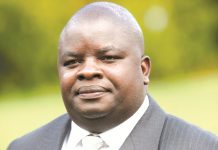How does one begin a tribute to an icon? How does one even write it?
Morgan Tsvangirai is dead.
It’s the hard truth which has slowly but certainly sunk in in the last few hours.
Death, the coward, was lurking close by and chose the day when millions celebrate the gift of love to sneak in and snatch him away. Forever. It is not a death that has visited a neighbour’s village, no. This is a death that has visited home. For that reason, the hat of the analyst sits uneasily on my head, and so it must yield. Instead, what follows is a personal account. There will be others more qualified than me, by virtue of their distance from him, to analyse the life and times of this remarkable man, now one of the newest residents of a universe unknown to us, but one to which we are all destined.
One evening in February 2012, I received a call from Douglas Mwonzora telling me that I was to meet with Morgan Tsvangirai at his home the next morning. I was working with COPAC, the parliamentary committee which was spearheading the writing of the new constitution. My home at the time was the Rainbow Towers and we had just finished our dinner after a very long day.
I was surprised by this instruction and I asked Mwonzora if we were going together. I was working directly with him and I thought Tsvangirai wanted us to present a progress report on the constitution-making process. No, said Mwonzora. Tsvangirai wanted to meet me on my own. I told him I did not know the way to Tsvangirai’s home but he told me not to worry. The next morning, arrangements were made and I was taken to Tsvangirai’s home. He was still living at his Strathaven residence.
I had no idea what I was going there for. Overnight, I had prepared a brief on the constitution-making process, just in case that is what Tsvangirai wanted from me. So I opened my file and he was surprised when I began to give him a report. “I have not called you for that, vaMagaisa,” he said politely before erupting into the trademark Tsvangirai laughter. An infectious laughter that everyone who knew him would instantly recognise. “But continue, since you already have something,” he said with a smile. So I gave him a run-down of the issues, including the sticking points and how were planning to deal with them. He listened patiently before dismissing a colleague who had brought me, saying he wanted some privacy.
That is the moment when Tsvangirai presented the reason he had called me. After a brief background, he then said, “I wondered if you might want us to work together. I need to boost my team and I thought you could help me”. It was a bolt from the blue. But what surprised me more was the humility with which the request was presented. Here was the mighty Morgan Tsvangirai, an icon of the democratic struggle revered by many, making a request in the most humble way possible.
Did he not know who he was? Did he not know that he could simply ask and thousands of Zimbabweans would fall over each other to do his bidding? Was he really asking me to help him? I was taken aback, pleasantly so, by the fact that he held me in such high regard. The man already had my respect, but this display of humility earned him more credit. If I have defended Tsvangirai too much over the years, it is probably because of the confidence he himself had shown in me. Even as I told him that I felt honoured, he implored me to go and think about it since it was a big step to take.
I told him that I would be happy but he would have to accept that I would be loyal to the truth and that sometimes I would have to disappoint him with the hard truth. “That is exactly why I am asking you to work with me,” he said. “I’m tired of being told what I want to hear all the time”
It was in these humble but frank circumstances that I came to work with Tsvangirai. Later, during the time we worked together, he discovered that I was of the Save totem and that therefore we were clansmen. This did not interfere with our working relationship. I was there as a professional, not as a clansman. When it was time for work, we worked as professionals. When it was time to relax, we shared lighter moments as clansmen. There was a never a moment of conflict between us, and when we disagreed it was with great respect for each other.
I discovered that being at the top can be a lonely experience. Oft-times, on Sundays, Tsvangirai would be at his home sitting outside on his own, with a glass of his favourite white wine. His phones were ever busy so I guess he was never really alone. When you have power, everyone wants to be your friend. There were so many characters who hovered around Tsvangirai only because he was Prime Minister but afterwards, there were nowhere to be seen. It taught me important lessons about the nature of human beings. I often visited him during these quiet moments. We would sit and talk, preparing for the week ahead. He and Robert Mugabe had a weekly meeting every Monday and one of my duties was to prepare the brief for that meeting. He used to joke, “Save, you are the one deciding what the old man and I are discussing, so you have power!” It flattered me. We would laugh and enjoy the moment. These occasions helped me to understand the man beyond the facade of officialdom.
It seemed to me that Tsvangirai was a man who had been thrust into his grand position by a combination of circumstances, some of his making and others, purely external, over which he had no control. His rise to become the powerful Secretary General of the Zimbabwe Congress of Trade Unions (ZCTU), the country’s umbrella organisation of the trade unions was down to a combination of his charisma, force of character, organisational strengths. Many Zimbabweans and around the world remember Tsvangirai the politician, but they don’t realise that he made his early mark as an accomplished trade unionist who fiercely stood for the rights of workers.
Politically, he was the right man at the right moment when a variety of forces converged to create the largest opposition movement in 1999 when the Movement for Democratic Change was born. He became, as many called him over the years, “the face of the struggle” and the most important political figure that defined a generational resistance against the vicious Mugabe regime. He took on the vile and repressive regime with the courage and determination that inspired a generation. He became the most recognisable face and name in Zimbabwean resistance politics, known and admired across the world. He was the man who more than most, gave Mugabe sleepless nights.
But to those of us who knew him personally, Tsvangirai remained unassuming and ordinary at heart. He was at his most relaxed not when sitting at the grand dinner tables with fellow world leaders but when he was with his friends from the mines in Bindura or at Humanikwa, his village in dusty Buhera. Whenever he had the opportunity, Tsvangirai drove to his village to spend the weekend with his mother and fellow villagers. He was the eldest child, but I got the impression he was still mother’s little boy – they were very tight. I thought about this strong bond during his last days because his mother was there with him till he drew his last breath. I can’t even begin to imagine what it did to her, seeing her beloved son depart before her. She will be utterly devastated that her Morgan is gone.
Some critics thought he had been consumed by the luxury of office when he became Prime Minister, but as I saw it, he was uneasy in those surroundings and would have preferred the humble confines of his village. He found issues of protocol and security frustrating and restrictive. He wanted freedom. One of his favourite hobbies was playing cat and mouse games with security and protocol officers whenever we were on tours. When you are Prime Minister, there is always someone watching you for security and telling you what to do, in terms of protocol. He found it all so suffocating and he would sometimes whisper to me that we must play hide and seek with them to see what they would do! I thought it must be boring at the top and he had to find things to entertain himself and these games were rather funny. Once security officers in one country went into a frenzy as they thought they had lost him after we had finished dinner. In the end, everyone saw the funny side when they “found him”! They later pleaded with me to help them keep an eye on him, and we joked that they would have to train me! That is the Tsvangirai I remember – a funny character with a generous sense of humour. I remember the man who felt trapped in the corridors of power and who would probably have been happier living an ordinary life without the constraints and protocols.
Tsvangirai was well aware of the many fake characters who hovered around him just because he was in a position of authority. He missed his real friends. One day, when we went to attend a rally in Bindura, his old hometown, he instructed his driver that we were leaving Harare early. On our way, he directed us to a house in a residential area in the small mining town. It was one of his old friends’ home. They were pleasantly surprised when a fleet of vehicles arrived and they saw Tsvangirai. Word quickly went around the compound and soon his old friends converged. Here was Zimbabwe’s Prime Minister arriving unannounced at an old friend’s home in the busy high-density area just to say hello to his mates.
“You haven’t changed, Baba vaEdwin!” His friend’s wife said as they laughed and reminisced about the old times. Because of his hectic schedule as a politician and Prime Minister, Tsvangirai rarely had private moments with his old friends. It was the fake business and political types of Harare who dominated his schedule. Tsvangirai asked for all his old friends. Some had died and others had moved back to their villages. Activity was low at the mines and young people had migrated to other cities or outside the country. We sat outside on the small veranda. I had never seen Tsvangirai so relaxed and so happy. He was among his people, old friends who reminded him of his humble beginnings. They did not judge him by his title - to them, he was just Baba vaEdwin (Edwin’s father) who had worked and lived with them for many years in the town as a miner. I had never seen him so free. For that half hour that we spent at his friend’s hour, we almost forgot that we had come for a political rally. We could have sat there all afternoon. His ability to blend and connect with ordinary people and his unassuming nature are qualities that I admired in him. They are also the qualities that gave him the edge over his political peers.
I got the impression that if he could, he would have happily returned to be with his old mates in this community from which he rose to prominence as a militant trade union leader some years before. Many people will remember Tsvangirai the leader of the democratic movement, but some of us will remember this unassuming character who just wanted to be happy among his friends.
For all his achievements as a leader of a democratic movement, Tsvangirai never presented himself as someone who knew it all. He was always willing to learn. He would ask questions and contrary to the image that many people were fed by the propaganda machine, he was no buffoon. I saw an avid reader with a solid intellect. He had grown into his role and he knew that he had to read books in order to keep his mind sharp and agile. Once he proudly presented to me Daron Acemoglu’s book Why Nations Fail and implored me to read it. Afterwards, we had some good discussions over a glass of wine. It was one of his favourite books. I gave him Paulo Coehlo’s The Alchemist, because, as I explained, no one should ever abandon his dreams. The journey to the Pyramids was long and difficult but one should never give up.
Over the last few months, it was clear that his health was deteriorating and not getting any better. He had fought bravely for nearly two years since the cancer was diagnosed. But cancer is a coward. For a time, it appeared to have relented and there was some hope. When we met last year, he was in good spirits. “We are preparing the programme for next year’s elections. I have travelled around the country and the people are responding,” he said with some confidence. He was being brave but I could see that the treatment was taking its toll on his body. It was painful seeing the veteran politician in that state. When I worked with him, he was always the fittest and healthiest among us and he would take pride in his good fortune. Now though, the cruel cancer was wrecking havoc on his body.
Tsvangirai had fought hard and defeated Mugabe, against all odds and should have been president had he not been cruelly denied by the system in 2008. Did he have any regrets? He always told me that in 2008 he had done what was necessary to save lives and he had no regrets about that decision. He could have been stubborn but that could have led to more deaths among Zimbabweans. He compromised and agreed to work with his nemesis. It was a difficult partnership and it would not have survived if Tsvangirai had decided to be stubborn like his counterpart. That it survived for so long and achieved what it got is down to his humility in the face of sheer arrogance and hostility that he had to put up with. It’s easy to look back with hindsight and say this or that could have been done, but one thing for sure is that in his heart, Tsvangirai believed he was doing the right thing for the people of Zimbabwe. “I don’t want to walk to State House over the dead bodies of fellow Zimbabweans,” he often said. He didn’t. He never will. But his legacy will live on.
He was not perfect, but who is? Years from now, people will remember the great sacrifices made by Tsvangirai. He survived a treason trial where he faced the death penalty. He endured rigged elections, more than once. He survived illegal detentions, beatings and torture at the hands of a repressive state machinery. But he remained focused. His legacy as a courageous fighter will inspire future generations. Many names walk the earth but when they go, they are easily forgotten. Tsvangirai has left a huge footprint which cannot be deleted from history.
Many have lost a leader. To me, Tsvangirai was not just a former boss. He was a clansman, too and someone whom I could comfortably refer to as a comrade and friend. Our relationship was both professional and personal, universes that intersected seamlessly. It is hard to believe that he is gone forever; that his name will not be on the ballot paper ever again. The loss is deeply personal. But I will forever cherish the memories of the time we had together in the proverbial trenches. He gave me a chance. I gave him my best. We suffered together. I remember the pain of waiting on July 31 and the pain of August 1. It was hard, but we remained solid to the very end. Now those of us that remain must take care of his legacy.
They might not decorate him as such, but he is a hero in the hearts and minds of millions. And if where the departed go they ask questions as to what one accomplished during their lifetime, in the case of Tsvangirai they will probably wave him in without question because his record speaks for itself. Every person’s balance sheet during their lifetime has assets and liabilities. For Tsvangirai, it is fair to say the asset side carries far greater weight than the side of liabilities.
Go well, Save …
WaMagaisa












